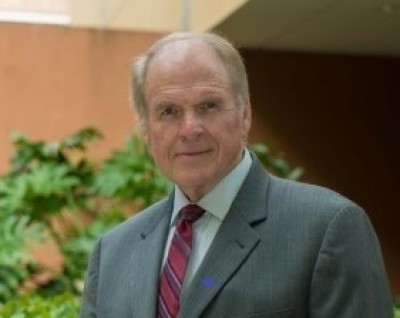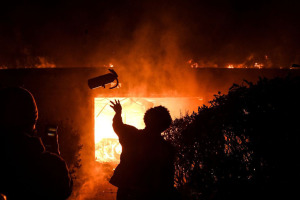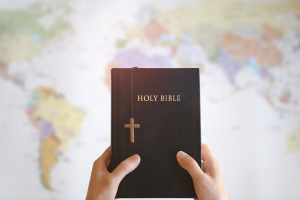The dangerous lure of power in times like these

The present crisis in the United States is worse than most realize.
There is a troubling dynamic that works subtly in nations passing through critical eras: The more intense the crisis the greater the lure of power.
The dangers of our time loom on every horizon — spiritual, political, economic, social, cultural. We face in these times corruption in churches, pandemic, disintegration of society, ever-widening division in the nation, shattering of moral boundaries, dissolution of family, uncertain leadership, intensifying lawlessness, perversion of education ... the list could go on. Add global threats squeezing in from every direction and an immigration crisis of unprecedented proportions.
“We have to do something about all this!” goes the urgent cry in governing institutions from the White House to the congressional house to the state house to the county seat to the city hall to the town hall.
And that’s when the lure of power and the loss of freedom begins creeping through the land.
Extreme measures are needed for extreme times goes the rationale. Of such panic dictatorships emerge, tyrannies arouse, and freedoms are lost.
Obviously, we need strong leadership in times like these. However, the stronger the leader the more important he or she understand the differences between power and authority.
George Washington got it.
John Adams wanted America’s chief executive to be called one of the following: His Highness, the President of the United States of America and Protector of the Rights of the Same, or His Elective Majesty, or even His Mightiness.
George Washington was concerned that Americans know they were not getting a monarch, but a leader who could be turned out at the will of the people, and who understood that he had not been elevated to office because he had a right to it, but because he was a servant of the people.
Washington was a no-frills person, and let it be known that “President of the United States” would be the title he and his successors would carry.
In our time, especially with the rise of the megachurch, there are in some places imperial pastors who are untouchable and deck themselves with lavish titles. They, as well as power-grabbing leaders in all spheres, understand the wiles of power but little about the biblical revelation concerning true authority:
- Authority is granted from the higher to the lower; power is seized by the strongest
- Authority is accountable to its transcendent source; power is accountable only to itself
- Authority is sustained through loving relationship and service; power is sustained by raw strength
- Authority leads through example and the free choice of those who are led; power controls through manipulation, intimidation, condemnation, domination.[1]
King Saul violated all these principles. During a strategic battle between Israel and the Philistines, Saul was at Gilgal, eagerly awaiting news of the outcome. Finally, his impatience took over. Saul arrogantly assumed that his position meant he could step into the office of Priest, which was occupied by Samuel. But Samuel was not present, and so Saul ordered the sacrifices. This hubristic presumptive action ultimately cost Saul his kingdom. (See 1 Samuel 13).
Our times certainly call for strong, decisive leadership. But the men and women in those roles must understand the ominous lure of power in dangerous periods.
Like Calvin Coolidge.
Just six years before Coolidge came to the presidency communists seized power in Russia. Western leftists watched eagerly for the implementation of socialism in the hopes that Europe and the United States would embrace or be forced into acceptance of the philosophy. (That effort goes on now).
Coolidge saw through it all. As a U.S. senator prior to becoming vice president and then president, Coolidge was called upon to help settle a bitter strike. Even after the issues were settled, he was concerned by the “violence and cynicism” he had noted on the part of the strikers.
In fact, “silent Cal” was “exasperated.” He wrote his stepmother a letter expressing concerns sharply relevant for today: “The leaders [of the strike] are socialists and anarchists, and they do not want anybody to work for wages. The trouble is not with the amount of wages; it is a small attempt to destroy all authority, whether of any church or government.”[2]
Coolidge was one of those enigmatic presidents who appear at the right time at the right place for right reasons. It was possible for people like Coolidge to rise to the presidency because of the nation’s core worldview.
G.K. Chesterton, the 20th century British journalist and author, was asked, “What is America?”
He replied that America is a nation with the soul of a church ... the only nation in the world that is founded on a creed ... set forth with dogmatic and even theological lucidity in the Declaration of Independence. ... It certainly does condemn anarchism, and it does also by inference condemn atheism, since it clearly names the Creator as the ultimate authority from whom these equal rights are derived.[3]
Therefore, “powers” can only be exercised under proper authority, flowing from God to the people, and through them to the government they choose, all “under God.” This is a major shift in governing style that had dominated six thousand years of recorded history.
It is vital in times of intense crisis that we and our leaders not forget the kind of nation we are and have been at our best in the worst of times.
That will save us from the lure of power and its distortions.
[1] I am indebted to Dudley Hall, an insightful Bible teacher and dear friend, for the four categories of control employed by raw power listed here.
[2] Shlaes, 115-116.
[3] Raymond T. Bond (ed.), The Man Who Was Chesterton (Garden City, NY: Image Books, 1960), 125.
Wallace B. Henley’s fifty-year career has spanned newspaper journalism, government in both White House and Congress, the church, and academia. He is author or co-author of more than 20 books. He is a teaching pastor at Grace Church, the Woodlands, Texas.
For media inquiries, contact: ChristianPost@pinkston.co



























